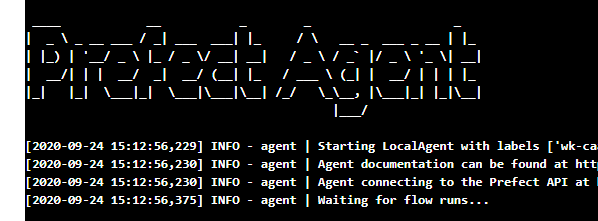Improve client API behavior when interacting with an unauthorized client api
See original GitHub issueCurrent behavior
Authorization of the client api is supposed to happen automatically through tokens specified in environment variables, configs or parameters. When tokens are not provided correctly, the api fails in various ways without telling specifically whats wrong - like a missing or wrong token.
Proposed behavior
Give better guidance on how to fix the underlying problem - failing authentication of the client or agent.
Example
- When
PREFECT__CLOUD__AUTH_TOKENisn’t configured, callingagent.registerleads to the errorprefect.utilities.exceptions.ClientError: Malformed response received from Cloud - please ensure that you have an API token properly configuredwithout telling specifically which token is missing and how to make sure it is provided. - When a token is provided, but the system hasn’t ever been logged on properly,
agent.registertries to search for the project using an unauthorized API, thus failing withprefect.utilities.exceptions.ClientError: [{'path': ['project'], 'message': 'field "project" not found in type: \'query_root\'', 'extensions': {'path': '$.selectionSet.project', 'code': 'validation-failed', 'exception': {'message': 'field "project" not found in type: \'query_root\''}}}]
Issue Analytics
- State:
- Created 3 years ago
- Comments:16 (1 by maintainers)
 Top Results From Across the Web
Top Results From Across the Web
Securing APIs: 10 Best Practices for Keeping Your Data and ...
Best Practices for Securing APIs · Prioritize security. · Inventory and manage your APIs. · Use a strong authentication and authorization solution.
Read more >How a RESTful API server reacts to requests - O'Reilly
Learn how to properly design RESTful APIs communication with clients, accounting for request structure, authentication, and caching.
Read more >Client created via management api is broken until dashboard ...
following a client create by API. It took quite a few hours to narrow down the root case of the problem. We're automating...
Read more >Client-Server API - Matrix Specification
Some API endpoints require authentication that interacts with the user. The homeserver may provide many different ways of authenticating, such as user/password ...
Read more >Guide to building an enterprise API strategy | TechTarget
APIs enable enterprises to better deliver diverse data and services to internal and external customers, and open up new revenue streams.
Read more > Top Related Medium Post
Top Related Medium Post
No results found
 Top Related StackOverflow Question
Top Related StackOverflow Question
No results found
 Troubleshoot Live Code
Troubleshoot Live Code
Lightrun enables developers to add logs, metrics and snapshots to live code - no restarts or redeploys required.
Start Free Top Related Reddit Thread
Top Related Reddit Thread
No results found
 Top Related Hackernoon Post
Top Related Hackernoon Post
No results found
 Top Related Tweet
Top Related Tweet
No results found
 Top Related Dev.to Post
Top Related Dev.to Post
No results found
 Top Related Hashnode Post
Top Related Hashnode Post
No results found

I’m then also starting the agent using
flow.run_agent().In order to get everything working from docker (isolated env) I had to:
PREFECT__CLOUD__AUTH_TOKENPREFECT__CLOUD__AGENT__AUTH_TOKENprefect auth login -t ${PREFECT__CLOUD__AUTH_TOKEN}What a beautiful picture in Azure Container Services towards the end of the week.
The goal was to get a minimal setup running with prefect and great expectations. Done.
I felt like I had the same issue. Simply had the
prefect.utilities.exceptions.ClientError: Malformed response received from Cloud - please ensure that you have an API token properly configurederror pop up. In my case, I hadn’t made the distinction between RUNNER and TENANT tokens. I tried settingPREFECT__CLOUD__AGENT__AUTH_TOKEN,PREFECT__CLOUD__AUTH_TOKENindividually and then together, but always to the same RUNNER token value, which was my mistake.And this was only giving an error in the docker container and not on my machine, since I had previously logged in as a USER with
prefect auth login.So for those of you new to Prefect such as myself who might have the same issue, you need a different token for
PREFECT__CLOUD__AGENT__AUTH_TOKENandPREFECT__CLOUD__AUTH_TOKEN, not the same one.